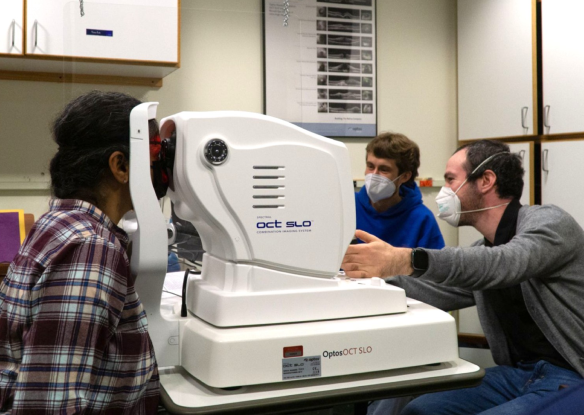

- Principal Investigator:
- Arvind Chandna
Contact Information
- Email:
- seelab@ski.org
- Email:
- cvi@ski.org
- Office Phone:
- (415) 345-2131
Binocular Vision, Strabismus, Amblyopia, Cerebral Visual Impairment
Our laboratory investigates mechanisms of normal and abnormal visual development in children and adults with special emphasis on cerebral visual impairment, acquired brain injury, strabismus and amblyopia. Our aim is to improve detection, diagnosis, treatment, and outcomes in childhood eye disease through rigorous scientific research.
There is a strong emphasis on translational research. We investigate globaly common eye diseases in children and in adults associated with long-term visual loss and morbidity with high socioeconomic costs and impacts.
If you are interested in being a participant in our work or want to know more about our research, either remotely via Zoom or in person in our lab, please get in touch with us at seelab@ski.org
Current projects:
Our projects involve remote telephone/video interviews and, in our physical laboratory we use non-invasive, quantitative methods, including: low-channel and high-density EEG steady-state visual evoked potentials (SSVEP); eye tracking and photorefraction in correlation with clinical findings:
- Cerebral Visual Impairment (CVI): Exploring three levels visual function deficits (HVFDs) in children with mild to moderate CVI
- Amblyopia and/or Strabismus : Studying mechanisms of visual function loss and recovery in amblyopia and strabismus
- Strabismus: Studying mechanisms of vergence and accommodation in strabismus and other clinical conditions (CVI, TBI)
- Eye Dominance: Role ocular dominance, sensory and motor, in oculomotor stability.
- Reading studies wih simultaneous messures of oculomotor control and accommodaton..
- Monocular Visual Loss: Comparing monocular and binocular sensory and motor functions
- Assessment and Intervention: Developing applications for visual assessment and training in babies and young children.
If you are interested in being a participant in our work or want to know more about our research, either remotely via Zoom or in person in our lab, please get in touch with us at seelab@ski.org
We are especially interested in the following eye conditions:
- Cerebral Visual Impairment and Brain-Based disorders of visually guided behavior
- Traumatic Brain Injury and other causes of Acquired Brain Injury
- Strabismus (misaligned eyes) since childhood
- Anismetropia (a significant difference in eyeglass prescription between the two eyes) since childhood
- Amblyopia (poor vision in one or both eyes since childhood often associated with strabismus and anisometropia)
- Cataract in childhood
- Loss of one eye in childhood
What is CVI?
Cerebral (previously known as Cortical) Visual Impairment is an overarching term covering a wide range of visual and perceptual visual impairments resulting from injury or dysfunction of visual pathways. While CVI can be caused by a wide variety of factors, most common is a lack of oxygen to the brain shortly before, during, or shortly after birth. CVI can be difficult to diagnose, as the eye itself may have average to near average vision. Children with CVI tend to have vision that improves over time, as their neuro pathways are elastic and can create alternate pathways to process the information perceived by the eye itself. Early diagnosis for CVI can be especially helpful as it speeds family support and professional intervention, allowing children to take advantage of learning environments that suit their needs and expand their capacity to process visual information.
Higher Vision Function Question Inventory (HVFQI) Study:
The HVFQI is a screening question inventory for parents with children of all ages and adults with a diagnosis or suspected diagnosis of cerebral visual impairment (CVI) to determine the pattern of their brain-based higher visual function deficits as a result of CVI of early and late-onset . Tehe interview is conducted remotely using a cloud based interactive based app. iWe hope to be able to make a significant difference to the assessment of children and adults with cerebral visual impairment once this international, remote study is completed. If you would like to participate please write to us at seelab@ski.org
CVIers Discussion Group for Parents and Older Children with CVI
A group for parents of children and children with Cerebral Visual Impairment (CVI) supported by clinicians, researchers and teachers of the visually impaired. Adult CViers also welcome to learn, share their experience for the benefit of parents and children.
The purpose of this group is to provide a centralized space for individuals -- including family members, researchers, doctors, educators, and more -- to discuss topics related to CVI. We specifically hope to create a safe environment in which we can achieve the following:
Parents will be able to discuss the challenges they face with their children with CVI. We aim to provide a forum for parents to share their own experiences while learning from other parents.
Older children will be able to discuss their own experiences living with CVI. They may contribute their own strategies for tackling shared difficulties, or choose to elicit advice from their peers.
Everyone will gain access to reliable and understandable information regarding CVI. We will also invite experts to share their knowledge.
Researchers will provide updates on recent developments in the field of CVI.
Group meetings will be held every 6 weeks via a secure online platform sponsored by Smith Kettlewell Eye Research Institute (SKERI), San Francisco and hosted by the Chandna SeeLab at SKERI. We expect meetings to last for approximately 1 hour.
If you are interested in joining our discussion group, or if you would like to learn more about CVI@SKI please write to us at seelab@ski.org
Adults with CVI Discussion Group
This group, due to start soon, is sponsored by the SeeLab at The Smith-Kettlewell Eye Research Institute and is comprised of adults with CVI, clinicians, vision scientists, and teachers with extensive experience in CVI. The main goals of this group are to provide a supportive space for adults with CVI to share their experieces while advocating for them, learn more about brain-based visual impairments, and introduce current research. If you are interested in joining, please contact with your name and e-mail address. seelab@ski.org

